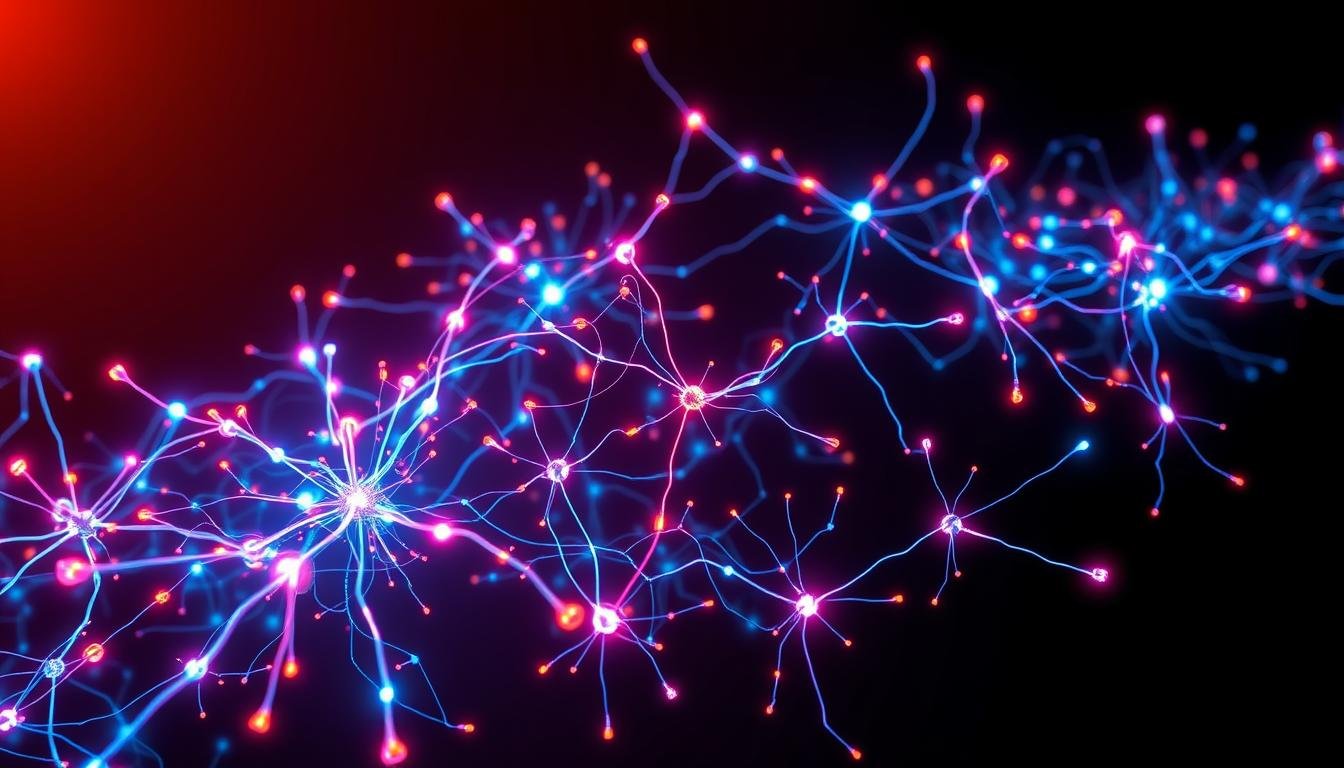If you can’t get online on your Android, you might have Wi-Fi problems. Issues like downloads not starting or getting stuck, and trouble with Google Play, are common. But don’t worry, there are ways to fix these issues and get your phone connected again.
Key Takeaways
- Identify signs of a poor Wi-Fi connection, such as download issues and app loading problems.
- Restart your Android device to resolve connectivity problems by stopping background processes.
- Check your mobile data connection and toggle between Wi-Fi and mobile data to troubleshoot.
- Ensure your Wi-Fi is turned on and you’re connected to the correct network with the right password.
- Restart your wireless router to reset the connection and address any technical issues.
Identifying Signs of a Bad Wi-Fi Connection
When your smartphone’s Wi-Fi isn’t working right, you’ll notice some signs. Downloads might not start, time out, or stay at 0% forever. This shows your Wi-Fi is unstable or weak.
Another sign is when the Google Play store gets stuck on the “Loading…” screen. This stops you from getting apps, updates, and more. Also, if web pages won’t load in your browser, your Wi-Fi is likely having trouble.
These problems – slow or broken downloads, Google Play issues, and web browsing troubles – mean your Wi-Fi connection needs fixing. Spotting these signs early helps you find and fix the wi-fi connectivity problems on your smartphone.
“Troubleshooting wireless network problems on your Android device can be a real headache, but recognizing the signs of a bad wi-fi connection is the first step towards a solution.”
General Troubleshooting Tips for Android Devices
When you face Wi-Fi issues on your Android, try some basic steps first. These can often fix common problems and get you connected again fast.
Restart your device
One simple yet effective step is to restart your Android. This can fix small software problems that might be causing Wi-Fi issues. A quick reboot can also stop apps from running in the background, which might solve the problem.
Switch between Wi-Fi and mobile data
If restarting doesn’t work, try switching between Wi-Fi and mobile data. This can help figure out if the problem is with your Wi-Fi or your device’s connection. Try using mobile data first, then switch back to Wi-Fi to see if it works.
Some steps might only work on Android 8.1 and later. Older versions might not have the same options. Also, some devices, like the Pixel 8 and Pixel 8 Pro, might need special troubleshooting.

By trying these general tips, you can often fix Wi-Fi problems on your Android. Remember to be patient and methodical. Some issues might need more advanced steps or professional help.
Fixing Mobile Data Problems
If you’re having trouble with your troubleshooting mobile data issues on android, don’t worry. There are steps you can take to fix it. First, make sure your android mobile data and cellular connection are turned on. Look for a signal strength icon to confirm you have an active data connection.
If the problem still exists, try using airplane mode to reset android network settings. Just turn on airplane mode, wait a bit, and then turn it off again. This can refresh your network connection and might fix your cellular data functionality.
- Check your mobile data settings to ensure it is turned on and that you have an active data connection.
- Try turning airplane mode on and off to reset your network settings.
- If the issue continues, consider contacting your carrier to inquire about any data plan usage or network outages.
Remember, fixing mobile data issues on your Android can take some trial and error. But these basic steps can often help resolve cellular data problems on smartphone and get you back online.
“Turning airplane mode on and off can be a simple yet effective way to reset your phone’s network settings and restore cellular data connectivity.”
Troubleshooting Wi-Fi Problems
First, make sure your Wi-Fi is on and you’re connected. If you don’t see the Wi-Fi icon or the bars are empty, you might be too far from the router. Try moving closer to see if it helps.
Check that Wi-Fi is Turned On & You’re Connected
Make sure Wi-Fi is on your Android device. Look for the Wi-Fi icon in the status bar or check the settings. If it’s off, just turn it on. Then, ensure you’re connected to the right network by checking the name and signal strength.
Restart Your Wireless Router
If you’re still having troubleshooting wi-fi connectivity on android or can’t checking android wi-fi status and connection, try restarting your router. This can fix many issues. Rebooting the router clears temporary problems and can restarting wireless router to fix network issues or resolving home wi-fi problems on smartphone. Lifewire says rebooting solves problems 75% of the time.
“Rebooting a router solves internet issues 75% of the time according to Lifewire.”
If restarting the router doesn’t work, you might need to look deeper into your network settings. Or, you might need to try other troubleshooting steps to resolving home wi-fi problems on smartphone.
How to Troubleshoot Wi-Fi Connectivity Issues on Your Smartphone
Having trouble with Wi-Fi on your Android phone? You’re not alone. Many people face common Wi-Fi problems that can ruin their online time. This guide will help you fix these issues step by step.
First, try restarting your phone. This simple step can solve many small problems. If that doesn’t work, switching between Wi-Fi and mobile data might help.
- Make sure Wi-Fi is on and you’re connected to your network.
- Restart your wireless router to fix many issues.
- Double-check your network name and password.
- Try moving closer to the router for a better signal.
If problems persist, look at your mobile data settings. Ensure cellular data is on and your plan supports it. Toggling airplane mode on and off can also reset your network.
For more complex issues, you might need to reset your network settings or even go back to factory settings. Remember, a factory reset will erase all your data, so back up important stuff first.
“Many modern routers can be rebooted to fix connectivity issues, either through a reset button, app controls, or by unplugging and replugging the device.”
Fixing Wi-Fi problems on your phone requires patience and careful steps. With effort, you’ll get your device online again. Happy browsing!

| Issue | Troubleshooting Steps |
|---|---|
| Wi-Fi signal is weak or unstable |
|
| Unable to connect to Wi-Fi network |
|
| Slow Wi-Fi speeds |
|
Addressing Hardware Issues
Sometimes, Wi-Fi problems on your Android device might be due to hardware issues. Let’s look at some common hardware problems that can affect your wireless connection.
Range and Proximity
Range and proximity are often the main culprits. If your device is too far from the router, the signal gets weak. Try moving your device closer to the router to see if it helps.
Your Phone or Tablet Case
It might surprise you, but your device’s case can also affect Wi-Fi. The case’s materials and design might block or disrupt the signal. Remove the case to see if your connection gets better.
Damaged Hardware
Damaged network cables, a faulty router, or other broken hardware can cause problems. Check your equipment and replace any worn or broken parts.
By fixing these issues, you can often solve Wi-Fi problems on your Android device. This includes range and proximity issues, the impact of cases on Wi-Fi, and fixing damaged hardware.

Resolving Software Issues
Software problems can cause Wi-Fi issues on Android devices. Old operating system software or app versions can mess with your wireless connection. Make sure your Android OS and apps are current by checking for updates.
Malware or viruses can also affect your Wi-Fi. Running a full antivirus scan can help find and remove harmful software. It’s key to keep your device’s security software updated for a stable wireless connection.
Outdated Software
- Check for and install any available updates for your Android operating system.
- Ensure all installed apps are running the latest versions by regularly updating them through the Google Play Store.
A Device Infection
Malware and viruses can disrupt your wireless network’s performance, so it’s important to take proactive steps to protect your device.
- Run a comprehensive antivirus scan to detect and remove any malicious software.
- Keep your device’s security software up-to-date to maintain robust protection against emerging threats.
“Updating your Android system and apps is crucial for resolving connectivity problems and maintaining a secure, reliable wireless network.”
Fixing software issues like outdated systems or malware can solve Wi-Fi problems on Android. Always keep your system and apps updated for the best performance and security.
Tackling Technical Issues
Fixing Wi-Fi problems on your Android is common. Sometimes, other devices or networks can mess with your signal. You can fix this by adjusting your router’s settings or upgrading to a dual-band model to resolve interrupted wireless signals and interference.
Other issues might include wrong network connections or hitting data limits. To solve these, adjusting router settings to improve connectivity and dealing with ISP data usage limits can help.
It’s also important to make sure you’re connected to the right network. Ensuring correct network name and password is key in fixing Wi-Fi problems.
Using a VPN can slow down your Wi-Fi. Try optimizing VPN performance for stable Wi-Fi by turning it off. Also, checking your Android Wi-Fi status and toggling it on/off can help ensure it’s working.
By tackling these technical issues, you can often troubleshoot Android Wi-Fi problems and get a stable connection back.
Advanced Troubleshooting Steps
If you’ve tried everything and your Android device still has advanced android wi-fi troubleshooting techniques issues, there are more steps to take. First, try resetting network settings to fix connectivity issues. This will remove saved Wi-Fi passwords and Bluetooth pairings. It can fix problems caused by bad network settings.
As a last resort, you might need to restore android device to factory defaults. This will erase all your personal data. But, it could solve software or system issues causing Wi-Fi problems. Make sure to back up important data before doing this.
- Reset network settings
- Revert to factory settings
Resetting your network settings can be very helpful. It removes saved Wi-Fi passwords, Bluetooth pairings, and other network settings. This can solve problems from bad settings or app conflicts.
If resetting your network settings doesn’t work, your last option is to reset your Android to factory settings. This will delete all your personal data, including apps and photos. It’s crucial to back up your device first. But, it might fix deep software or system issues causing Wi-Fi problems.
| Troubleshooting Step | Description | Potential Outcome |
|---|---|---|
| Reset network settings | Clears out saved Wi-Fi passwords, Bluetooth pairings, and other network-related configurations | Can help resolve issues caused by corrupted network settings or conflicts between apps and services |
| Revert to factory settings | Wipes all personal data and reverts the device to its original factory settings | Can potentially fix underlying software or system issues causing persistent Wi-Fi connectivity problems |
Remember, these advanced steps should be your last choice. They will reset your device to its default state, requiring you to set it up again. But, if you’ve tried everything else, these steps might solve your advanced android wi-fi troubleshooting techniques problems.
Conclusion
We’ve gone over many steps to fix Wi-Fi problems on your Android phone. You now know how to spot bad connections and fix hardware, software, and technical issues. Start with simple fixes and move to more complex ones if needed.
If Wi-Fi still doesn’t work, contact your internet service provider or phone maker for help. With the right steps and effort, you can get back to browsing smoothly on your Android.
The main points from this guide are to troubleshoot step by step, use available resources, and try everything, including contacting your service provider. This ensures a stable Wi-Fi connection on your Android.






